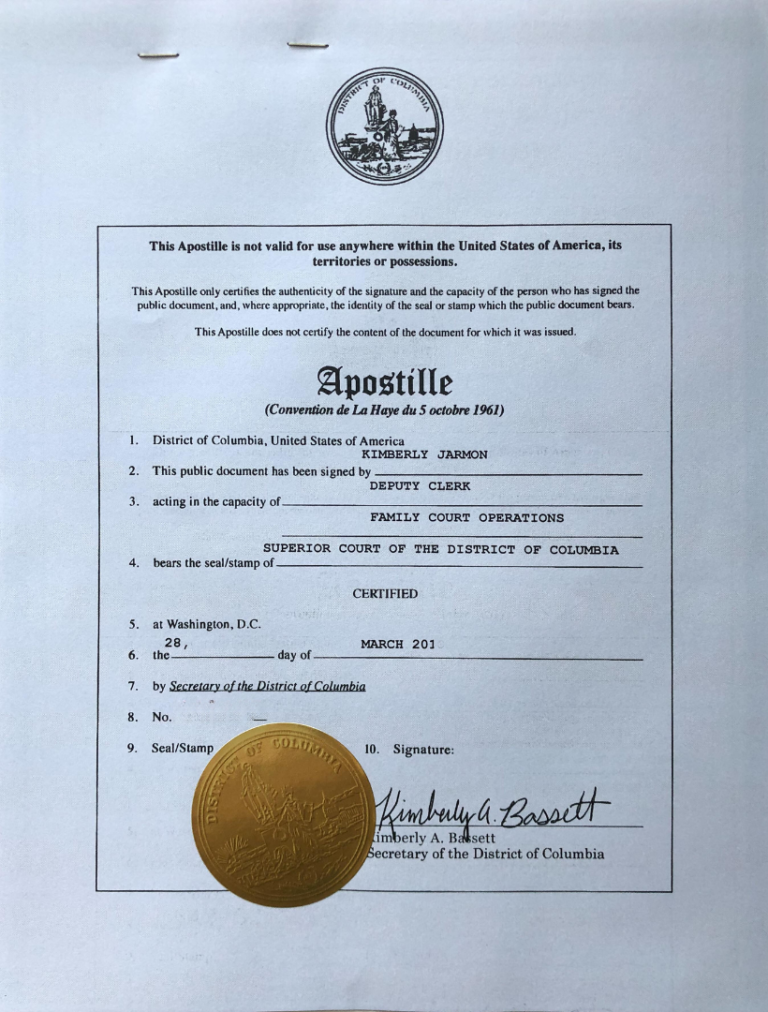Understanding the Secretary of State Apostille Certificate
What is the Secretary of State Apostille Certificate?
The Secretary of State Apostille Certificate is attached to your document from the Secretary of State’s Authentication office in the state where the document originated.
The primary purpose of an Apostille is to simplify verifying the authenticity of documents for international use. It allows documents to be recognized in foreign countries without needing further authentication by consulates or embassies. Once an Apostille is issued, the document is accepted in all member countries of the Hague Convention.
Documents that are eligible to receive the Apostille Certificate include:
State or government issued documents such as:
- Birth Certificates
- Death Certificates
- Marriage Certificates
- Divorce Decrees
- Court Orders
- Adoption Papers
- Police Records
- Academic Diplomas and Transcripts from Public Institutions
- Medical Records (from public hospitals)
Notarized documents such as:
- Private School Transcripts and Diplomas
- Personal Letters
- Contracts and Agreements
- Affidavits
- Medical Records (from private hospitals)
- Power of Attorney
- Parental Consent Forms for Travel
Business Documents State issued or Notarized document:
- Articles of Incorporation
- Certificates of Good Standing
- Commercial Contracts and Agreements
- Board Resolutions
- Company Bylaws
- Business Licenses
- Financial Statements (once notarized)
- Trademark and Patent Applications
- Shareholder Agreements
- Business Invoices (once notarized)
Document Requirements:
- Document Eligibility
- Request a Certified Copy of a Vital Record
- How to Notarize a Document
- Document Type: Ensure the document is a certified birth certificate, marriage certificate, or court order. Private documents often need notarization first.
- Condition: The document must be in good condition without any alterations or damage.
- Signature and Seal: The document must have an official signature and seal from the issuing authority.
- Certification: Some private and public document may need prior certification by a notary or county clerk.
- Translation: Documents in a foreign language may need a certified translation.
- Document Age: Some documents must be recently issued.
If the document does not meet these requirements, it may be rejected by the Secretary of State, potentially causing delays and complications in your certification process. You would then have to request a new certified copy.
Request a Certified Copy of a Birth, Death, Marriage, Divorce, or Single Status Certificate:
For a Vital Record: Obtain a certified copy from the issuing authority, which may involve requesting a copy from the relevant government agency:
- For vital records, visit the CDC website for more information
- Or contact us for vital record request service.
Court Record: Determine which court holds the necessary record (e.g., civil, criminal, family court).
- Visit the Court Clerk’s Office for more information
- Or contact us for Court Document retrieval Services.
Easy Steps to Get a Document Notarized:
Prepare the Document:
- Make sure your document is complete and ready for signing.
- Do not sign the document yet; you must sign it before the notary.
Find a Notary Public:
- Locate a notary public near you. They can often be found at banks, post offices, libraries, or shipping stores (like UPS or FedEx).
- Some notaries offer mobile services and can come to you.
- You can also search online for notary services in your area.
Make an Appointment (if needed):
- Contact the notary to check their availability and whether you need an appointment.
- Some places may offer walk-in services.
Gather Identification:
- Bring a valid, government-issued photo ID, such as a driver’s license, passport, or state ID card. The notary needs to verify your identity.
Go to the Notary:
- Take the document and your ID to the notary public.
Sign the Document in Front of the Notary:
- The notary will ask you to sign the document in their presence.
- The notary may also require you to take an oath or affirm the truthfulness of the document’s content.
Notary Reviews and Stamps:
- The notary will check your ID, witness your signature, and then sign, stamp, or seal the document.
- The notary will also record the notarization in their official journal.
Pay the Notary Fee:
- Pay the notary’s fee. Fees can vary by state and type of document, but they are usually a nominal amount.
Receive the Notarized Document:
- The notary will give you the notarized document. It is now officially notarized and ready for its intended use.
Tips:
- Check Requirements: Verify if there are any specific requirements for notarization in your state or for your specific type of document.
- Multiple Signers: If multiple people need to sign, ensure they are all present with their IDs.
- Copies: If you need notarized copies, bring them along with the original document.
By following these simple steps, you can quickly get your document notarized.
- Albania
- Andorra
- Antigua and Barbuda
- Argentina
- Armenia
- Australia
- Austria
- Azerbaijan
- Bahamas
- Bahrain
- Barbados
- Belarus
- Belgium
- Belize
- Bolivia
- Bosnia and Herzegovina
- Botswana
- Brazil
- Brunei Darussalam
- Bulgaria
- Burundi
- Canada
- Cape Verde
- Chile
- China,
- Hong Kong &
- Macao
- Colombia
- Cook Islands
- Costa Rica
- Croatia
- Cyprus
- Czech Republic
- Denmark
- Dominica
- Dominican Republic
- Ecuador
- El Salvador
- Estonia
- Fiji
- Finland
- France
- Georgia
- Germany
- Greece
- Grenada
- Guatemala
- Guyana
- Honduras
- Hungary
- Iceland
- India
- Indonesia
- Ireland
- Israel
- Italy
- Japan
- Jamaica
- Kazakhstan
- Korea, Republic of
- Kosovo
- Kyrgyzstan
- Latvia
- Lesotho
- Liberia
- Liechtenstein
- Lithuania
- Luxembourg
- Malawi
- Malta
- Marshall Islands
- Mauritius
- Mexico
- Moldova,
- Monaco
- Mongolia
- Montenegro
- Morocco
- Namibia
- Netherlands
- New Zealand
- Nicaragua
- Niue
- North Macedonia,
- Republic of
- Norway
- Oman
- Pakistan
- Palau
- Panama
- Paraguay
- Peru
- Philippines
- Poland
- Portugal
- Romania
- Russian Federation
- Saint Kitts and Nevis
- Saint Lucia
- Saint Vincent and the Grenadines
- Samoa
- San Marino
- Sao Tome and Principe
- Saudi Arabia
- Senegal
- Serbia
- Seychelles
- Singapore
- Slovakia
- Slovenia
- South Africa
- Spain
- Suriname
- Swaziland
- Sweden
- Switzerland
- Tajikistan
- Tonga
- Trinidad and Tobago
- Tunisia
- Turkey
- Ukraine
- United Kingdom of Great Britain
- and Northern Ireland
- Uruguay
- Uzbekistan
- Vanuatu
- Venezuela
F.A.Q
You might need an apostille certificate for things like getting married, starting a new job, enrolling in school, or handling legal matters abroad. It ensures that your important documents are recognized and accepted by foreign authorities.
You can consult with us to determine if your document can obtain the apostille certificate. If it can, we will ask you to mail us the document, and we will take care of the apostille process for you. Once completed, we will send the original apostilled document back to you in your new country via DHL.
- The apostille process can take 2-4 weeks, though rush services may be available on a state-by-state basis. Once completed, we will mail the original apostilled document back to you in your new home country. Processing times can vary, and international shipping via DHL usually takes 3-5 business days, so please plan accordingly.
- In Washington, D.C., apostille certificate processing can be completed the same day or within 24 hours.
- For the Commonwealth of Virginia Apostille certificate processing typically takes 9-12 business days. Rush services is currently available.
- Professional Translation Services: If a translation is needed, use a certified translation service to ensure accuracy. Elite Documents can help with both translation and apostille services.
- Translation After Apostille: It’s often best to get the apostille first, then have the document translated. This ensures the translation includes the apostille certification. Whether you translate the apostille page depends on your preference or the requirements of the requesting agency; it’s not mandatory but sometimes required.
- Always check with the country of destination or the requesting agency for their specific requirements regarding document translation and apostille procedures, as these can vary.
Certified translations typically take 1-3 days to complete, depending on the project size and current workload of our translators. Notarization will be done in the District of Columbia, our secretary of state walk-in service facilitates the apostille process, allowing documents to be apostilled on the same day.
- Yes, you can apostille a translation as long as the translation is an original hard copy that has been completed with notarization. This means the translation itself needs to be notarized to certify its accuracy and authenticity. It will receive an apostille from the state where the notarization took place. The apostille verifies the authenticity of both the original document and the notarized translation in that particular state. We can help apostille a translation as long as the translation is an original hard copy completed with notarization.
Yes, you can get an apostille for a document issued in a different country if both countries are part of the Hague Apostille Convention. The apostille certifies the document’s authenticity for use in another member country without additional legalization. If you need help processing a foreign document for apostille, contact us for more details. We have facilitators around the world who can assist with the process.
No, they’re different. Notarization is done by a notary public to certify a document’s authenticity within your home country. An apostille is a step further, making the document internationally recognized in other Hague Convention countries.
- Original Document: You must have the original vital record certificate issued by the appropriate authority (e.g., civil registry, vital statistics office). Some states may have requirements regarding the age of the document, such as not older than 5 years in some cases or no more than 1 year old in others.
- If you’re unsure about the specific requirements in your state or country, it’s best to contact the Secretary of State’s office or the relevant legalization authority directly for accurate information. Elite Documents can also provide assistance with understanding and meeting these requirements.
- To ensure your court record is eligible for an apostille certificate, it typically needs to be an original document issued by the court. It should include the court’s official seal or stamp, and any signatures or certifications by the court clerk or judge must be clearly visible.
- If you do not have a court record, Elite Documents can assist you in retrieving one and obtaining the apostille certificate, ensuring all necessary steps are handled efficiently.”
We work with the following States Authentication Offices to obtain your Apostille Certificate swiftly.
- Alabama
- Alaska
- American Samoa
- Arizona
- Arkansas
- California
- Colorado
- Connecticut
- Delaware
- District of Columbia
- Florida
- Georgia
- Guam
- Hawaii
- Idaho
- Illinois
- Indiana
- Iowa
- Kansas
- Kentucky
- Louisiana
- Maine
- Maryland
- Massachusetts
- Michigan
- Minnesota
- Mississippi
- Missouri
- Montana
- Nebraska
- Nevada
- New Hampshire
- New Jersey
- New Mexico
- New York
- North Carolina
- North Dakota
- Northern Mariana Islands
- Ohio
- Oklahoma
- Oregon
- Pennsylvania
- Puerto Rico
- Rhode Island
- South Carolina
- South Dakota
- Tennessee
- Texas
- U.S. Virgin Islands
- Utah
- Vermont
- Virginia
- Washington
- West Virginia
- Wisconsin
- Wyoming
Sample Apostille Certifiates:
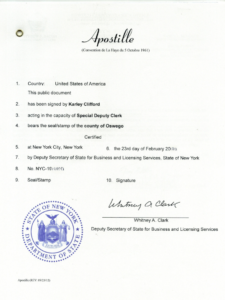
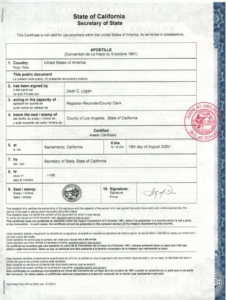
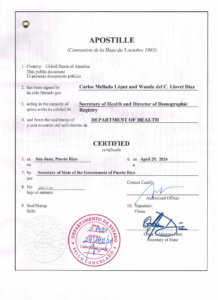
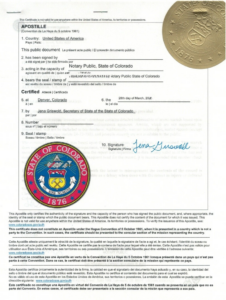
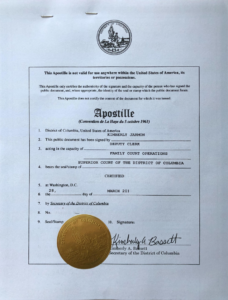
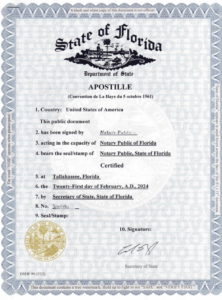
Get your documents recognized worldwide with ease—contact us for your Apostille needs today!
Must-Read Post: Document Tips for Traveling and Relocating
Essential Legal and Financial Planning Tips for Americans Retiring Abroad
Essential legal tips for Americans abroad, financial planning for American...
Read MoreNavigating the Process of Document Legalization for Vietnam: A Florida Business’s Success Story
How Elite Documents Simplified the Process of Obtaining a Notarized...
Read MoreApoyando a Abogados en América Latina y México: Elite Documents Facilita la Autenticación de Documentos en EE.UU.
Relocating your Wyoming business abroad requires certified and apostilled copies...
Read MoreLiving Well on a Budget: The Top 5 Affordable Countries for Retirees
Living Well on a Budget: The Top 5 Affordable Countries...
Read More
